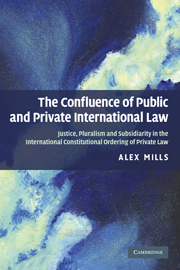 The Confluence of Public and Private International Law
The Confluence of Public and Private International Law Book contents
- Frontmatter
- Contents
- Acknowledgments
- Index of cases, judicial opinions and arbitral awards
- Abbreviations
- 1 Justice, pluralism and the international perspective
- 2 The private history of international law
- 3 From positivism to constitutionalism
- 4 Private international law and constitutional law in federal systems
- 5 The confluence of public and private international law
- 6 Conclusions
- Bibliography
- Index
4 - Private international law and constitutional law in federal systems
Published online by Cambridge University Press: 20 January 2010
- Frontmatter
- Contents
- Acknowledgments
- Index of cases, judicial opinions and arbitral awards
- Abbreviations
- 1 Justice, pluralism and the international perspective
- 2 The private history of international law
- 3 From positivism to constitutionalism
- 4 Private international law and constitutional law in federal systems
- 5 The confluence of public and private international law
- 6 Conclusions
- Bibliography
- Index
Summary
Introduction
This Chapter investigates the relationship between private international law and constitutional law in federal systems that contain diverse rules of private law. This analysis is conducted in order to explore an analogy and a research agenda suggested by the identification in Chapter 3 of the idea of ‘international federalism’. Because this Chapter is exploring an analogy, its purpose is not to identify or comment on the current rules or practice of private international law in federal systems, but rather to examine the ideas and theories relating to private international law which have been developed in these states as a result of their federal structure, the ways in which the ideas of private international law have been affected by or are part of the constitutional ordering of these federal systems. Whether or not these ideas and theories are now (or ever were) operative, they may still be usefully applied by way of analogy in the context of the emerging idea of international federalism. As explored in Chapter 3, this idea involves secondary norms which deal with the distribution of regulatory authority between states and between the international and national realms. By looking at the effect on private international law of equivalent norms within federal systems, this Chapter identifies a conceptual framework which provides the foundations for a new perspective on international private international law.
- Type
- Chapter
- Information
- The Confluence of Public and Private International LawJustice, Pluralism and Subsidiarity in the International Constitutional Ordering of Private Law, pp. 115 - 210Publisher: Cambridge University PressPrint publication year: 2009


